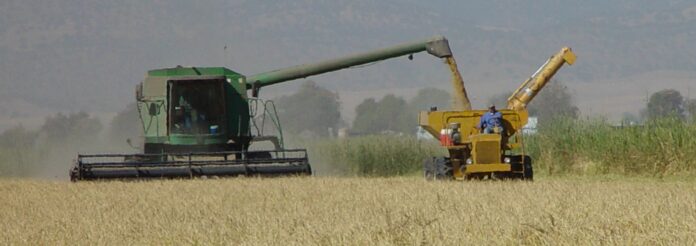 The Glenn Colusa Irrigation District met at its headquarters on Thursday, April 15, 2021. Chairman Don Bransford called the meeting to order at 9:00am. There were a couple of growers who wanted to start fertilizing and needed to know when the water transfers will take place. General Manager Thad Bettner said they are working some things out with the US Bureau of Reclamation and the State Board about temperature control. He said the plan isn’t finalized yet but it sounded like in concept at least things are heading in the right direction.
The Glenn Colusa Irrigation District met at its headquarters on Thursday, April 15, 2021. Chairman Don Bransford called the meeting to order at 9:00am. There were a couple of growers who wanted to start fertilizing and needed to know when the water transfers will take place. General Manager Thad Bettner said they are working some things out with the US Bureau of Reclamation and the State Board about temperature control. He said the plan isn’t finalized yet but it sounded like in concept at least things are heading in the right direction.
A Side Note
On a side note anyone who follows water entity meetings know the majority of the districts hold their meetings on Tuesday or Thursday on the second or third week of the month. That can make it difficult to provide as wide as coverage as liked. What’s been nice about GCID’s schedule is most of the time the competing meetings, although important, don’t get in the way of finding out what’s happening in the Sacramento Valley. Today, however, the Friant Water Authority held a special board meeting at the same time. Public access to GCID is by phone and the FWA meeting is held on Webex. Friant’s meeting was the vote for the $50 million cost share agreement on Friant Kern Canal repairs. That agreement is vital to getting the repairs started and was the culmination to months of often heated negotiation. It was an important meeting as is the Glenn Colusa. I tried to listen to both. I’m not that talented but fortunately the Friant meeting was a record breaking 28 minutes short. All of this to say I came on board with the GCID meeting after it had been running for a half hour. If the meeting followed the agenda I missed public participation beyond the snippet above, the approval of the minutes and a presentation by ACWA JPIA Vicechair Tom Cuquet – could have learned more about insurance but. . .
Prop 218
I believe I dropped in at item 6 B. where the board was discussing a draft of a Prop 218 engineer’s report supporting a revised benefit assessment. It was said the impact on the constituents is to shift some of the district’s expenses from water rates to land assessments. About a third of the costs would come from land, a third from water sales and a third from other water fees based I believe on the year’s hydrological conditions, i.e. critical year verse noncritical year.
Although I couldn’t see any of the charts and backing documents it was interesting to hear the costs were divided into two estimates, almonds and rice. And it sounded like the years 1920 and 2021 were also compared. That seemed like a widespread but that’s what I heard. In the San Joaquin Valley districts have been shifting cost funding from water tolls to land based assessments. That makes sense as you never know how much surface water will be available to sell. There is the perception the Sac Valley mostly has enough surface supplies to finance its districts. I think in general that may be at least partly true but as with most things dealing with water it could very well be counter intuitive.
I did hear it said the proposals will be ready to present to the landowners by the end of May after an intense listening period to gather feedback from the landowners by those preparing the 218 Election materials. There has already been landowner outreach with limited comments. One grower said this new assessment would be greater than his property tax. But in many cases the total costs could stay pretty steady or increases would be acceptable because some of the water costs could decrease. Someone asked if instead of calling it something different than an assessment would be allowed. There are legitimate concerns about the public outreach efforts being successful in reaching everyone with enough information. Farmers are like herding cats and it can be challenging. Someone suggested calling this a Sacramento River Special Benefit Fee or some such. I’m not an attorney and I’ve never played one on TV but I wonder if it’s legal to call it anything but an assessment. My sense is 218 Elections are more common in the San Joaquin Valley. I know Consolidated ID in Selma tried three times until they were able to get it passed. But most folks in CID know what a 218 Election is.
of calling it something different than an assessment would be allowed. There are legitimate concerns about the public outreach efforts being successful in reaching everyone with enough information. Farmers are like herding cats and it can be challenging. Someone suggested calling this a Sacramento River Special Benefit Fee or some such. I’m not an attorney and I’ve never played one on TV but I wonder if it’s legal to call it anything but an assessment. My sense is 218 Elections are more common in the San Joaquin Valley. I know Consolidated ID in Selma tried three times until they were able to get it passed. But most folks in CID know what a 218 Election is.
The process of a 218 Election is not like a regular election. Only the ballots returned count. If you don’t participate it defaults to a yes vote. It was said on average only 30 percent of eligible voters participate in 218 Elections. MK Elections will conduct the vote and Provost & Pritchard will prepare the required engineering report. Luis Jarvis is GCID’s Finance Director had he gave most of the presentation I dropped into the middle of.
Water Supply
If there is some extra water available for secondary processes the board needs to set some dates. There are options for some growers in this district to idle or fallow land as there is a lot of rice planted. That crop has different water requirements and jargon to go along. The Secondary Water Allocation was approved.
The water transfer policy was next and it was said it could be a brief discussion or a long discussion. Someone said the policy might be perfect but the board wanted a redline version to compare to the older version to see the changes. It was said most of the other districts in the area don’t have enough growers to make a valid comparison so reaching out to them for examples might not be productive.
The board was asked to consider approval of a 2021 Water Transfer Policy with the Colusa Drain Mutual Water Company and find the agreement exempt from CEQA. It was said there is a maximum of 20,000 a/f and should be very similar to last year’s agreement. The board agreed.
Groundwater
The board next spoke about the Colusa Groundwater Authority Groundwater Management Areas. SGMA’s grip is descending on Sac Valley. The aquifer there isn’t in as bad a shape as the SJV so it got a two year later start for implementation. The speaker said the CGAGMA has an outreach team and is trying to reach landowners. There will be a meeting on April 22nd. She asked the board to read a report she was handing out, make comments and get back to her so she can relay that to the consultants. Someone said management areas may well be needed to protect the district. It sounded like there are areas with greater recharge and areas with overdraft. Management areas can be established to set apart problem locations in a Groundwater Sustainability Area and not trigger a undesired result under SGMA. Water Operations
Water Operations
It was said GCID has a 350 cfs diversion coming into the district. Rice, orchards and pastures are the big users. There will most likely be pumping required to get through the year if I understood correctly. There have been policies that would require any diverter wasting water to comply within 72 hours to knock it off. It was suggested that is too lenient a consequence under the circumstances. Staff recommended the ditch tenders circle the fields to be sure there are checks and solid berms. It was also recommended the board appoint a committee to look at modifying the policy to include a much shorter response time and consider imposing fines for wasting water.
fields to be sure there are checks and solid berms. It was also recommended the board appoint a committee to look at modifying the policy to include a much shorter response time and consider imposing fines for wasting water.
There is a program that can allow growers to keep the cover crop on the field and qualify for some kind of bird habitat credit.
There is a Sacramento River Plan from 2017 the Bureau wants a public hearing for. Yet there are the 2020 and the 2021 plans in the works as well. I really didn’t understand that but I know the Bureau can work in mysterious ways.
Finances
I’m guessing Jarvis gave the financial reports saying someone dropped off a half a million payment yesterday. Good for them. GCID is halfway through its fiscal year and there will be a budget review next month. The speaker said his favorite part of the report was – and at that point there was a robo announcement that the meeting was being recorded and the call hung up. I called back and heard something about a damage claim, but I don’t know what happened.
Info
Information Reports were next and it was said every other week the Northern California Water Association has a drought management meeting with about 50 participants from managers to attorneys to Bureau to State Board folks and it’s a real event. It was said the communication has been very good but for the State Board’s inertia. There are hopes there could be some pressure brought to bear on the State Board by the Newsom Administration.
With that the meeting went into closed session at 10:50am.
DISCLAIMER OF RESPONSIBILITY; Waterwrights.net strives to provide clients with the most complete, up-to-date, and accurate information available. Nevertheless, Waterwrights.net does not serve as a guarantor of the accuracy or completeness of the information provided, and specifically disclaims any and all responsibility for information that is not accurate, up-to-date, or complete. Waterwrights.net’s clients therefore rely on the accuracy, completeness and timeliness of information from Waterwrights.net entirely at their own risk. The opinions expressed in this report are those of the author and do not represent any advertisers or third parties.
ALL RIGHTS RESERVED. Copyright 2021 by DAW/WaterWrights.net
GLENN COLUSA ID – President Donald R. Bransford, Vice President Peter Knight, John Amaro, Logan Dennis and Blake Vann.
Staff: Thaddeus Bettner – General Manager, Zac Dickens – District Engineer, Kevin Nelson – Superintendent, Louis Jarvis – Finance Director, Andy Hitchings – Attorney Somach, Simons & Dunn.
GCID
344 East Laurel Street
Willows, CA 95988
530/934-8881
contact@gcid.net
DWR SGMA # 5-021.52
From the GCID website: Glenn-Colusa Irrigation District (GCID) is dedicated to providing reliable, affordable water supplies to its landowners and water users, while ensuring the environmental and economic viability of the region. As the largest irrigation district in the Sacramento Valley, GCID has a long history of serving farmers and the agricultural community and maintaining critical wildlife habitat. The District fulfills its mission of efficiently and effectively managing and delivering water through an ever-improving delivery system and responsible policies, while maintaining a deep commitment to sustainable practices. Looking ahead, GCID will remain focused on continuing to deliver a reliable and sustainable water supply by positioning itself to respond proactively, strategically and responsibly to California’s ever-changing water landscape.






























